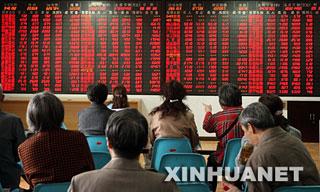Source: CCTV.com
04-25-2008 11:23
China cut the stock trading tax from 0.3 to 0.1 percent. It came into effect on Thursday. The move pushed up the country's stock market by over 9 percent, its biggest one-day jump in a decade.
 |
| Investors look over information at a stock exchange at a stock trading hall in Beijing, April 24, 2008. Equities trading tax cut, which is widely believed as policy boost by government to stem the recent slump, sends Chinese shares 9.29 percent higher on Thursday, the biggest gain since Oct 23, 2001.(Xinhua Photo) |
The Shanghai Composite Index closed 9.29 percent higher at 3,583 points, posting its second biggest rise this decade, after jumping as much as 9.60 percent in early trade. Most Shanghai shares rose by their 10 percent daily limits. The move was widely anticipated by market professionals and lured investors back into the market.
Major Teng, Manager of Investment of Advisory Department of Everbright Securities said "We feel that the market had expected this reduction of the share trading tax. This measure of reducing the share trading tax shows that the Chinese government is keen to protect the healthy and stable development of its stock market. And we can see the market has also reacted POSITIVELY to this measure."
Miss Guo, one investor said "Of course, this is great news for us, I am very happy. But the most important thing for us is whether this can support the market's stable development."
China cut the stamp duty on share trades to 0.1 percent from 0.3 percent Wednesday evening, in a fresh move to shore up the slumping stock market. In China, changes to the stamp duty charges are crucial to investors' psychology, as the tax cut not only affects trading costs, but more importantly, it indicates the stance of China's securities regulators. But many analysts say, they expected the trading tax would be changed from two- to one-way, but it's definitely the strongest boost to weak investor sentiment in recent days. The Shanghai Composite has almost halved from its peak of 6,124 recorded last October, destroying over a trillion yuan in value during the slump.
Editor:Xiong Qu
